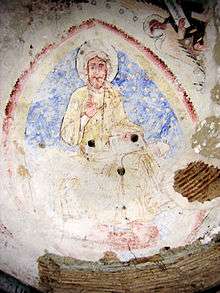Definify.com
Webster 1913 Edition
Fresco
Fres′co
,Fres′co
,Webster 1828 Edition
Fresco
FRES'CO
, n.Definition 2026
fresco
fresco
English

Noun
fresco (plural frescos or frescoes)
- (uncountable) In painting, the technique of applying water-based pigment to wet or fresh lime mortar or plaster.
- (countable) A painting made using this technique.
- A cool, refreshing state of the air; duskiness; coolness; shade.
- (Can we find and add a quotation of Prior to this entry?)
Translations
|
|
Verb
fresco (third-person singular simple present frescoes, present participle frescoing, simple past and past participle frescoed)
- To paint using fresco
Translations
|
|
See also
Anagrams
Dutch
Pronunciation
- Hyphenation: fres‧co
Etymology
From Italian fresco, from Medieval Latin friscus, from Proto-Germanic *friskaz, whence also Dutch fris.
Noun
fresco n (plural fresco's, diminutive frescootje n)
Italian
Pronunciation
- IPA(key): /ˈfreː.sko/
Etymology
From Medieval Latin friscus, frescus, from Lombardic frisc, from Proto-Germanic *friskaz, from Proto-Indo-European *preysk-.
Adjective
fresco m (feminine singular fresca, masculine plural freschi, feminine plural fresche)
Antonyms
- asciutto (3)
Noun
fresco m (plural freschi)
- coolness, freshness, cool
- light wool material
- (informal) cooler (prison)
- stare al fresco ― to be in the cooler
Related terms
Antonyms
Anagrams
Portuguese
Etymology
From Old Portuguese fresco, from Medieval Latin frescus, friscus, from Germanic *frisk, Proto-Germanic *friskaz, from Proto-Indo-European *preisk-.
Pronunciation
- (Portugal) IPA(key): /ˈfɾeʃ.ku/
- Hyphenation: fres‧co
Adjective
fresco m (feminine singular fresca, masculine plural frescos, feminine plural frescas, comparable)
- fresh (new or clean)
- (of plant material) fresh (of produce, not from storage)
- cool (having a slightly low temperature)
- (slang) fussy (tending to complain about petty details)
Spanish
Etymology
From Medieval Latin friscus, frescus, from Germanic *frisk, Proto-Germanic *friskaz, from Proto-Indo-European *preisk-.
Adjective
fresco m (feminine singular fresca, masculine plural frescos, feminine plural frescas)
Synonyms
- (cheeky): insolente
Noun
fresco m (plural frescos)